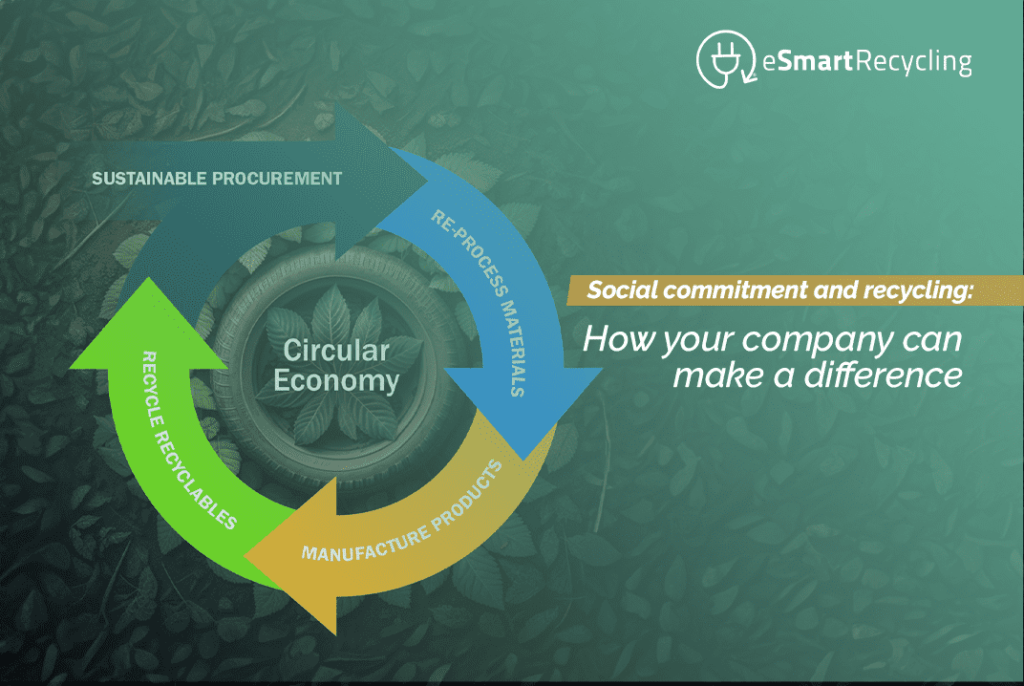
As the world gradually faces the environmental crisis, companies are increasingly expected to play a proactive role in sustainability. From renewable energy to carbon emission reduction, the public demands greater social responsibility from businesses. Investing in recycling initiatives is one of the most direct ways to impact the environment and meet these demands positively.
Recycling is more than separating plastics, glass, and paper; it’s about actively participating in the circular economy to conserve natural resources. This article will explore how recycling can help your company make a difference while fulfilling its sustainability and corporate social responsibility obligations.
The circular economy is an economic and environmental concept emphasizing the importance of reusing, remanufacturing, and recycling materials. This approach diverts resources from landfills and creates a more sustainable system with less waste. Brands can contribute to this circular economy by ensuring their products and packaging are designed to be reused, remanufactured, or recycled.
Investing in recycling initiatives has numerous benefits for companies, including reducing waste management costs, avoiding fines for environmental regulation compliance, and generating cash by reusing materials. By diverting material from landfills, companies also create new revenue sources by selling recyclable materials. Additionally, recycling can enhance a company’s brand image and reputation, providing a competitive edge. Consumers becoming more environmentally conscious are more likely to purchase from companies that demonstrate a commitment to sustainability and corporate social responsibility. Forcing companies to act on recycling and sustainability will give them an advantage in competitive markets.
Recycling for companies should include a comprehensive strategy that addresses all aspects of recycling. This means adhering to local recycling laws and working to incorporate sustainability into every part of operations. Companies can become industry leaders by incorporating eco-friendly practices, such as reducing waste, using renewable resources, and minimizing energy consumption. Hiring a waste management specialist can facilitate the transition to an environmentally friendly business model. A waste management specialist can help companies assess their waste generation, develop strategies to minimize it, and collaborate on select initiatives like equipment renewal and donations.
A waste management strategy should also include initiatives designed to market a company’s commitment to sustainability and corporate social responsibility. Offering the public a transparent view of a company’s sustainability efforts will help build customer trust. Marketing efforts can include educational campaigns, product labeling, and social media posts. Companies should aim to convey their recycling practices’ positive environmental impacts to customers and stakeholders.
Lastly, recycling initiatives must consider the tangible expectations of consumers. In today’s aware world, consumers increasingly demand that companies be environmentally responsible. Beyond environmental responsibility, corporate social responsibility should also protect human rights and the well-being of communities where companies operate. By incorporating opportunities for customer participation, recycling initiatives can help companies achieve impactful results.
Many leading brands have made substantial commitments to recycling, corporate social responsibility, and the conservation of natural resources. For example, Unilever has committed to becoming a zero-waste and carbon-neutral company by 2020. The company has begun implementing recycling programs to achieve this goal and will make all its global factories run on 100% renewable energy by 2025. Apple recently introduced “Daisy,” a robot capable of recycling almost all parts of an iPhone. The robot was designed to extract valuable materials from recycled devices, contributing to Apple’s goal of making its business more sustainable.
Recycling can significantly impact a company’s sustainability and corporate social responsibility. By implementing a comprehensive recycling strategy, companies can reduce waste, create new revenue sources, and enhance their brand image. Engaging consumers through marketing efforts can help companies build trust and loyalty while reducing negative environmental impacts. Leading brands like Unilever and Apple are already taking active steps to reduce their carbon footprint and support the circular economy. As demand for a circular economy grows, companies must start investing in recycling initiatives to make a difference.
Companies are expected to take responsibility for their environmental impact in today’s modern world. One of the most direct ways to meet the demands of a sustainable and circular economy is through recycling. A well-executed recycling strategy can help companies reduce waste, create new revenue sources, and enhance brand image, ultimately providing a competitive advantage in today’s markets. The time has come for all companies to commit to recycling to impact the environment positively.
More and more companies are starting to implement electronic device recycling programs to reduce their environmental impact and meet their sustainability goals. However, getting employees to participate in e-recycling programs can be quite challenging. In this article, we’ll discuss some strategies to increase employee participation in electronic recycling programs within companies.
The first step to increasing employee participation in e-recycling programs is ensuring that all employees understand the benefits of recycling electronic devices. Recycling is not only good for the environment, but it can also help companies save money, reduce their carbon footprint, and create a positive image for the company. Make sure to explain these benefits in detail to educate employees about the importance of electronic recycling.
Many employees may have concerns about electronic recycling, such as data security and understanding what can and cannot be recycled. Companies need to address these concerns and provide employees with the information they need to feel comfortable participating in the program. For example, companies can create a data security policy, inform employees about the types of devices that can be recycled, and provide electronic recycling bins in common work areas to make participation even easier for employees.
Another way to encourage employee participation in e-recycling programs is to introduce incentives. Incentives can take many different forms, such as discounts on company services or products, time off, or recognition and rewards. These incentives can help employees feel that they are making a difference and can also foster a bit of friendly competition in the office.
The most important step to increasing employee participation in e-recycling programs is to implement a company-wide policy that makes electronic recycling mandatory. This policy can include specific instructions on recycling devices, such as where and how they should be recycled, as well as which types of devices are allowed. Providing clear instructions can help ensure that all employees understand what is expected of them and are more likely to participate.
Implementing an e-recycling program in the company and increasing employee participation can be a challenging task. However, by educating employees about the benefits of e-recycling, addressing common concerns, introducing incentives, and applying a company-wide policy, companies can take steps to ensure their e-recycling program is a success. By making electronic recycling fun and easy for employees, companies can help create a more sustainable work environment and encourage employees to do their part to help protect the environment.
Electronic waste is a significant issue in the modern world. Many Americans use electronic devices, which become obsolete within a few years, contributing to the enormous problem of electronic waste. This e-waste can have severe effects on human health and the environment, as well as added costs for businesses. So, what can companies do to reduce the amount of electronic waste they generate?
In this guide, we will explore practical strategies for reducing electronic waste in your business, including tips for recycling, reusing, and prolonging the life of your electronic devices. We will also discuss the potential advantages of reducing electronic waste in your organization and look at some real-life examples of companies that have made significant progress in this area.
Electronic waste, or e-waste, refers to all unwanted and obsolete electronic products, such as computers, monitors, televisions, audio and video equipment, and phones. E-waste contains harmful substances like lead, barium, and brominated flame retardants, which can have serious health and environmental consequences.
In addition to these health issues, electronic waste can be costly for organizations. In many cases, companies have to pay for the safe disposal of their e-waste, so it makes good business sense to take steps to reduce the amount of electronic waste they generate.
There are several strategies that businesses can employ to reduce the amount of electronic waste they generate. Some of these strategies include:
This can help ensure that your organization only buys the electronic devices it needs and does so in an environmentally friendly manner.
Regularly updating IT equipment can help ensure that devices don’t become obsolete, reducing the amount of electronic waste your organization generates.
This can help ensure that valuable materials from electronic devices are recovered and reused, contributing to reducing the environmental impact of creating new devices.
Prolonging the life of electronic devices can be a cost-effective way to reduce electronic waste by keeping devices in use longer before replacing them.
Reducing the amount of electronic waste generated in your business has several benefits. In addition to reducing the impact on health and the environment, the cost savings associated with reducing electronic waste can be significant. For example, Dell estimates that its Asset Recovery Services program has saved it around $50 million annually.
Reducing electronic waste can also help a company’s image, as customers are increasingly aware of the environmental footprint of the products they use. Taking steps to reduce electronic waste can help ensure that the public sees companies as environmentally responsible organizations.
Many companies have taken significant steps to reduce the amount of electronic waste they generate. One example is Best Buy, which has implemented a program that has helped it recycle more than 2.5 billion pounds of electronic waste over the past decade. Another example is HP, whose Sustainable Impact program has helped it recycle over 1.1 billion pounds of electronic waste.
Electronic waste is a significant problem in the modern world and can have severe consequences for health and the environment. However, there are several practical strategies that businesses can employ to reduce the amount of electronic waste they generate. These strategies can result in significant cost savings and a more positive image for the organization. Real-world examples like Best Buy and HP also demonstrate that companies can take steps to reduce the amount of electronic waste they generate.
With the rise of the digital era, the electronic devices we use daily are increasingly made from electronic waste materials. The explosion of the Internet of Things (IoT) and wireless mobile devices has changed how we interact with the world around us. Consequently, the demand for electronic waste recycling has significantly increased, and many companies are entering this field. But is electronic waste recycling profitable?
This article will cover some fundamental concepts and underlying notions about electronic waste recycling. We aim to examine the role of electronic waste recycling in a company’s bottom line and how it can be used to significantly reduce the number of discarded products through proper recycling methods.
Electronic waste, or e-waste, refers to any electronic equipment that is obsolete or no longer in use. This can include computers, televisions, mobile phones, VHS and DVD players, e-readers, printers, and other devices. Electronic waste recycling is the process of recovering valuable and reusable materials from electronic devices. This concept is becoming increasingly important as electronic product disposal rates rise with advances in nanotechnology and higher levels of electronic technology.
The benefits of electronic waste recycling cannot be underestimated. While many people and businesses may consider electronic waste a burden, recycling it can significantly reduce the financial costs of purchasing new devices and help increase the value of electronic equipment. Additionally, reducing the total volume of discarded electronic devices protects the environment from the ecological impact of electronic waste materials.
Furthermore, electronic waste recycling programs offer economic benefits. For instance, many companies today seek to reduce expenses, and electronic waste recycling provides a cost-effective means to achieve this goal. The materials collected from electronic waste, such as precious metals—gold, silver, copper, and even palladium—can be sold to various companies at a premium price. This, in turn, creates new revenue streams for companies and helps improve their bottom line.
As with any business, profitability is the ultimate goal. Many companies have already recognized the financial potential of electronic waste recycling and are capitalizing on the trend. Some of the most lucrative options for electronic waste recycling include the resale of used electronic equipment, the recycling of second-hand electronic devices, and the processing of secondary raw materials.
One of the most profitable ways to recycle electronic waste is through the processing of secondary raw materials. After extracting the battery and casing parts, the remaining electronic devices are disassembled, and the valuable components are cleaned. This process allows for the extraction of precious metals from electronic waste materials. The extracted materials can then be sold directly to smelting companies for profit.
Electronic waste recycling offers substantial economic rewards, and with the rise of IoT technologies and wireless devices, the demand for electronic waste recycling continues to grow.
Companies increasingly turn to electronic waste recycling programs to reduce costs and increase profits by recycling old electronic devices for reusable materials. Moreover, the environmental benefits of electronic waste recycling are well-documented. Investing in electronic waste recycling could be an excellent opportunity for companies looking for new revenue sources and an eco-friendly way to achieve economic gains.
Are you someone who loves technology? Whether you use it for personal or professional purposes, you can’t deny modern devices’ impact on our daily lives. We live in an era of almost limitless technological potential, and we do our best to make the most of it. Unfortunately, this also means it’s easier than ever to accumulate old and outdated technology.
While this old hardware and software may be languishing in the corner of your home, out of sight and mind, the fact is that it has the potential to hinder the present and future well-being of your devices seriously. That’s why it’s so important to regularly declutter and recycle old technology. Read on to learn more about this common problem and what you can do about it.
It’s easy to shrug off old technology as something not worth worrying about, but the truth is it can have serious consequences. The biggest issue is security risks, as outdated software and hardware lack crucial security updates. These devices are essentially an open invitation for hackers to infiltrate your system. Additionally, these devices can become unstable and slow as they age. Having an old, slow computer can be frustrating for anyone, but it also poses productivity issues for professional use.
Another often overlooked concern is the environmental impact. Electronic devices can be extremely hazardous to the environment if not disposed of properly. Modern devices contain small amounts of highly carcinogenic materials, such as lead and mercury. When these substances are improperly discarded, they can leach into the soil, contaminating groundwater and posing a serious health risk to those who come into contact with them.
Old technology can cause many problems if left unchecked. The best thing you can do is periodically review your home and decide what is worth keeping and what can be safely discarded or recycled. If your old devices still work, consider donating them to a charity. These organizations often refurbish and redistribute computers and other devices to families in need.
If your device is truly unusable, consider finding a reputable electronic waste recycling center. These places will dispose of old electronic devices safely and environmentally. Most also offer hard drive wiping services, ensuring all your sensitive data is completely and securely erased before recycling.
It’s also worth talking to an IT professional to ensure all your devices are up-to-date and secure. They can help you find the best place to recycle your electronics and offer advice on updates and newer devices if needed.
Technology is exciting and accessible, and some of us are constantly on the hunt for the next big thing. But we can’t forget about what we already have. Old technology poses many overlooked risks. It’s important to be proactive in recycling and properly disposing of obsolete devices. Not only is it the most environmentally responsible choice, but it’s also the safest way to ensure your sensitive data is protected and your devices are secure from potential security risks.
The best thing we can all do is be aware and responsible when it comes to using technology. Regularly declutter and stay informed about updates, as well as explore electronic waste recycling as a viable option. By doing so, you can protect your devices and the environment from potential harm.
Protecting the environment and generating value are two key areas every organization must consider. E-recycling can significantly contribute to environmental protection and value creation through the reuse or recycling of electronic waste. However, organizations face several barriers when trying to implement e-recycling systems. In this article, we will examine four internal barriers and offer an approach to overcome them.
Many organizations struggle to implement electronic recycling because they do not understand the environmental context or its potential impacts on the business. It is important to quantify potential environmental impacts and understand the associated environmental legislation. Additionally, internal communication about the importance of environmental stewardship is crucial to creating a culture that supports e-recycling.
Organizations also face difficulties in implementing e-recycling because they do not understand the economic context or its potential impacts on the company. It is essential to comprehend the economic benefits that e-recycling can bring to the organization. Communicating with different areas of the company to demonstrate that e-recycling can create value is equally important.
Another internal obstacle organizations face when implementing electronic recycling is overcoming resistance. Resistance may come from key decision-makers or employees. It is important to create a work environment that promotes the necessary cultural change essential for the successful implementation of e-recycling. This means promoting e-recycling and its benefits to the organization and understanding the concerns of those who oppose it.
Companies often struggle to integrate electronic recycling policies into existing systems or processes. For example, policies or processes may need modification to accommodate the changes e-recycling brings, and internal IT systems may need improvement to support the implementation. To overcome this internal barrier, it is crucial to design a solid project plan and select the right team members for execution.
Implementing electronic recycling is crucial for creating value and protecting the environment. However, many organizations face internal barriers when attempting to undertake this task. It is important to understand environmental impacts and legislation while promoting cultural change within the organization. Additionally, understanding and showcasing economic benefits is necessary to overcome resistance and integrate e-recycling into existing processes. By applying effective project management, organizations can overcome these internal barriers and achieve the benefits of e-recycling.
By addressing these barriers head-on and implementing strategic measures, companies can successfully integrate e-recycling programs, leading to long-term environmental and economic benefits.
Companies that can not only expand their reach but also attract customers and talent who share their values ultimately gain a competitive advantage. Corporate sustainability has gained increasing relevance in recent years and is no longer just a trend; it’s a necessity. Now more than ever, companies strive to be more transparent, responsible, and impactful. Prioritizing sustainability efforts can help businesses connect with new customers and talent in a deeper and more meaningful way.
In today’s world, consumers increasingly expect the products and services they purchase to have a positive impact on people and the planet. According to a 2018 consumer survey by Accenture, nearly half (48%) of U.S. consumers said they would be willing to make some compromises to achieve an environmental impact. Moreover, 81% of those surveyed expect companies to be good corporate citizens, always considering environmental, social, and community well-being. There is also a growing wave of competition to be more sustainable: an international survey of executives conducted by PwC found that 91% of companies recognize the benefits of sustainability, and 80% include sustainability in their strategy or business plan.
Businesses that prioritize sustainability can establish stronger relationships with their customers. Earning trust and loyalty is fundamental to business success, and demonstrating an authentic commitment to sustainability is one of the key ways to achieve this. According to the 2019 Porter Novelli/Cone Purpose Biometrics Study, 77% of consumers believe that a company must address social and environmental issues. If a company makes sustainable decisions, it can increase brand loyalty and deepen customer relationships because consumers perceive that the company’s values align with their own.
One way companies can increase customer loyalty and demonstrate their commitment to sustainability is by participating in initiatives like carbon offsetting or environmental advocacy. These practices show that a company not only “talks the talk” but also “walks the walk.” Companies can also educate their customers about their sustainability efforts, helping customers connect with the brand and trust that it is making responsible decisions. For example, Levi Strauss & Co. has been cultivating its strong sustainability brand for years. One way it has achieved customer loyalty is through consumer education, such as launching the “Water<Less Jeans” campaign, which customers see as Levi’s action to reduce water consumption.
In addition to building new customer relationships, corporate sustainability can also attract, engage, and retain talent. According to a Cone study, 76% of millennial employees said they would be more likely to stay with a company with a strong purpose, while also highly valuing proactive leadership and an empowering corporate culture.
When companies demonstrate a commitment to sustainability, employee engagement and loyalty increase, as employees are more likely to feel personally connected to the organization. It also makes the organization more attractive to potential employees, as millennials increasingly value companies with an authentic commitment to social impact.
MGM Resorts International undertook a company-wide sustainability initiative, which not only significantly impacted their environmental outcomes but also created a new culture among employees. Committing to sustainability has led to a greater sense of purpose within the company, as employees now know they work for a company dedicated to contributing to a better world.
Corporate sustainability is not only beneficial for the long-term health and well-being of the planet but also for businesses. It can help companies stand out in a crowded market and develop strong, lasting relationships with their customers and employees. Companies that take seriously the creation of a positive impact through sustainability have the opportunity not only to attract new customers and talent but also to solidify their reputation as a responsible and forward-thinking brand.







If you want to know more about the different programs, partners, and overall cool things happening in the eSmart world, share your email with us, and Join the E-Revolution.


